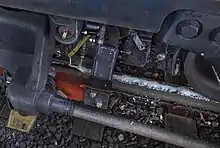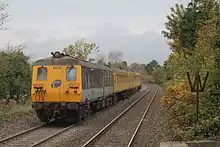Sandite
Sandite is a substance used on railways in the UK, Ireland,[1] US,[2] the Netherlands[3] and Belgium[4] to combat leaves on the line,[5] which can cause train wheels to slip and become damaged with flat spots. Sandite consists of a mixture of sand, antifreeze and steel shot.[6]
Leaf build up on the railhead can also cause signalling issues and 'disappearing trains' on the rail control systems (because of the electrically insulating effect of the leaves, which can prevent operation of track circuits).
British Rail conducted research, in 1976, to determine the suitability of Sandite for use as an adhesion improver.[5]
Application

Sandite is usually applied by a special train which first clears fallen leaves from the rails using high-pressure water, then sprays the sandite onto the rail surface.[7] To assist the staff on the Sandite train in locating the sites concerned, in England and Wales black on yellow lineside markers were installed:[8]
- The first sign, with three stripes gives advance warning of a Sandite application site
- The second sign, with two stripes points where application should begin
- The third sign, with one stripe points where application should end
From 1992, lineside marker boards were installed on the Scottish Region, based on alternative white octagonal boards to denote the commencement and finish points, with no warning sign.[9]
In The Netherlands, Sandite is applied by the first passenger trains of the day,[10] with special maintenance trains available too.
Belgian Infrabel operates a dedicated train, with a diesel engine at either end.[11]
Equipment

Multiple units used for this have included:
- British Rail Class 937
- British Rail Class 936
- British Rail Class 951
- British Rail Class 960
- British Rail Class 930
- Northern Ireland Railways Class 80
- Northern Ireland Railways MPV
English Welsh & Scottish Railways and Weedfree Limited provide locos, drivers and equipment operators for the Autumn treatment circuit.
Direct Rail Services provide locomotives for loco-hauled stock.[12]
References
- "LLOYD RAIL - Improving rail networks world wide". www.lloydrail.ie.
- "MTA LIRR - Slippery Rail". web.mta.info.
- "ProRail start werkzaamheden tegen herfstgladheid". NU. 16 October 2012.
- ""Schuurtrein" moet sporen deze winter ijsvrij houden". deredactie.be. Retrieved 15 November 2016.
- "Archived copy" (PDF). Archived from the original (PDF) on 30 October 2004. Retrieved 13 October 2007.CS1 maint: archived copy as title (link)
- "sandite | Safety Central". safety.networkrail.co.uk.
- Rail Head Treatment Train @ Fotopic.Net
- "Section 29: Signs for Engineering Trains and Test Trains". Railway Signs and Signals of Great Britain. Sections: 29.6, 29.7, 29.8. Retrieved 8 September 2018.CS1 maint: location (link)
- "Section 29: Signs for Engineering Trains and Test Trains". Railway Signs and Signals of Great Britain. Sections: 29.11, 29.12. Retrieved 8 September 2018.CS1 maint: location (link)
- https://www.youtube.com/watch?v=OhYEREMr1Oo
- "Infrabel maakt zich klaar voor de winter: speciale treinen moeten sporen berijdbaar houden". De Standaard Mobile.
- http://neil-gibson.fotopic.net/c1380406.html%5B%5D